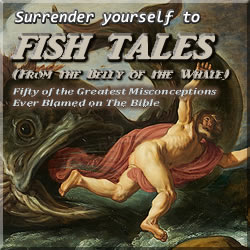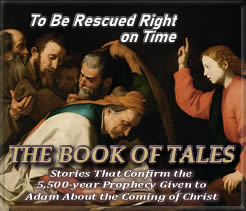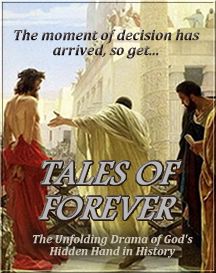The Next Paradigm Shift
A Different Way of Seeing
While most people still might find it hard to accept the validity of the lost books, lost chronologies, and lost truths detailed here, they would be more inclined to do so if a clear-cut connection could be made between them and those things they already associate with mainstream biblical truths—things like The Ark of the Covenant and The Septuagint Bible. And, quite frankly, to expect otherwise would be the height of folly on my part, especially considering the fact that part of the enigma surrounding these lost truths have actually occurred as a direct result of God’s own desire to withhold a knowledge of these things until the time when a future generation was destined to rediscover them.
Therefore, keep in mind, I have no objection to the general reluctance of most Christians in this; in fact, knowing what I know about the unfolding drama of God’s hidden hand in history, I gladly accept a healthy dose of skepticism. The only thing I do find intolerable, though, is the stubborn unwillingness on the part of any so-called “truth-seeker” to at least open their minds to the possibility that if—and this is a very important if here—if a sound biblical basis for them can be adequately demonstrated.
After all, it is no great secret that the hardest part of relating to the controversial subject matter contained in this work—subjects like scriptural interpretation, biblical chronology, and religious artifacts—is overcoming the psychological hurdles that are the result of a lifetime of skepticism and doubt. But the greatest tragedy of all would be if, once the validity of these lost books, chronologies, and truths was sufficiently demonstrated, the evidence was disregarded and dismissed simply because certain books and chronologies had not been included in the modern Canon.
Story Continues Below
Says Richard Price—the founder and CEO of Academia.edu—on his podcast In Depth With Academia:
The Book of Days: In Search of the 5,500-year Prophecy Given to Adam About the Coming of Christ is:
To hear Price’s book review of The Book of Days, CLICK HERE.
To hear Kent and Zen Garcia continue their discussion concerning the implications of the 5,500-year chronology from Adam to Christ as it pertains to the faithfulness of God, CLICK BELOW.
Story Continues From Above
In terms of the entire span of human history, however, this is certainly nothing new. In ages past, nearly every generation has been confronted with one such dilemma or another, whereby what was once thought to be “the truth and nothing but the truth” was challenged, then rocked to its core, and finally overturned by the next “paradigm shift.” A term coined by American physicist Thomas Kuhn, in 1962, paradigm shift refers to a fundamental change that occurs in the basic ideology of science—a change that opens up entirely new vistas of perception that would never have been considered valid until that moment in time. Originally applied only to scientific thinking, this term has since evolved to the point that it is also used to describe changes in numerous non-scientific models or perceptions. Accordingly, the Swiss theologian and author Hans Küng has applied Kuhn’s theory of change to the history of human awareness so that for Küng a paradigm shift is what occurred with both the Protestant Reformation and the Age of Enlightenment. Speaking about this kind of radical change in the field of theology, Küng described it this way:
In theology … from time to time, there are drastic changes… As in the change from the geocentric to the heliocentric theory, from phlogiston to oxygen chemistry, from corpuscular to wave theory, so also in the change from one theology to another: Fixed and familiar concepts are changed; laws and criteria controlling the admissibility of certain problems and solutions are shifted; theories and models are upset.
In a word, the paradigm, or model of understanding, is changed, together with the whole complex of different methods, fields of problems, and attempted solutions as had previously been recognized by the theological community. The theologians get used to a different way of seeing things, to see them in the context of a new model. Some things are now perceived that were not seen formerly, and possibly some things are overlooked that were formerly noticed. A new view of man, world, and God begins to prevail in the theological community, where the whole and its details appear in a different light.1
From this, it also follows that for a paradigm shift to occur there must be a considerable accumulation of information and experience to elicit such a change, all of which, as one can imagine, can only occur through the coordinated efforts of committed individuals over the span of several decades. In rare cases, the onset of a paradigm shift can be noted with a fair amount of accuracy, as with the Reformation, which is dated from 1520, and is widely attributed to the influence of one man, Martin Luther, and one document, his Ninety-Five Theses, which he nailed to the church door in Wittenberg. More often than not, though, there is little consensus as to when this shift occurs, as with the Enlightenment, which is said to have begun as early as the middle of the seventeenth century and as late as the beginning of the eighteenth century. And whereas one man looms above all others in the case of the Reformation, numerous names stand out in regard to the inception of the Age of Enlightenment. In philosophy, there were Rene Descartes, Immanuel Kant, and Voltaire; in politics, John Locke, Jean-Jacques Rousseau, and Thomas Hobbes.








